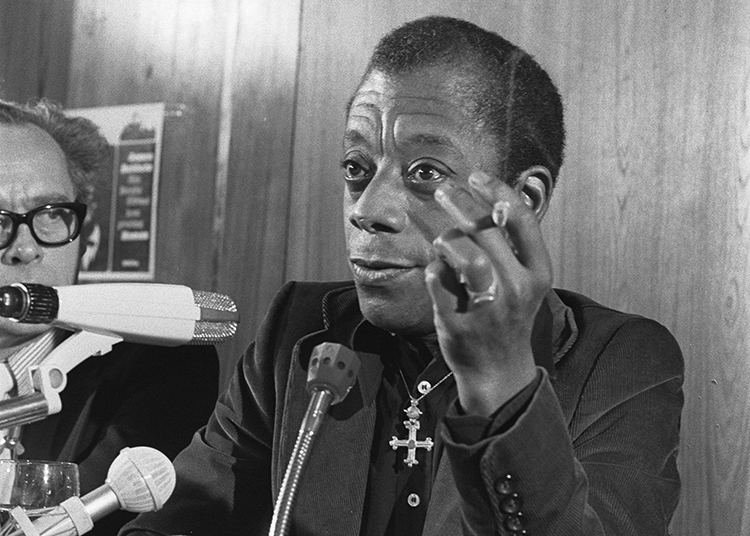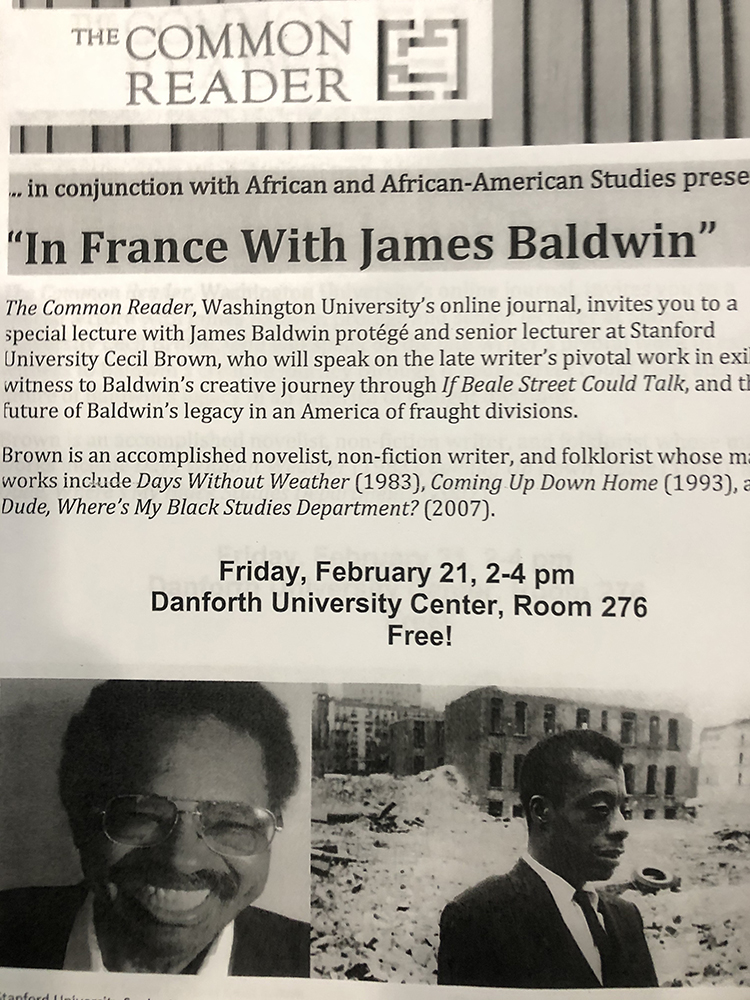The time James Baldwin told UC Berkeley that Black lives matter
Alum, lecturer and longtime friend recounts his time with Baldwin and what his 1979 Berkeley speech means today

June 19, 2020

James Baldwin pictured here in 1979 at the steps of UC Berkeley’s Doe Library. The prolific writer’s words continue to remain relevant more than 30 years after his death. (Photo courtesy of the Bancroft Library)
Commemorated around the world as the day slavery ended in the United States, Juneteenth is a day to reflect on Black Americans’ vibrant culture, enduring resilience and rich history. But the words of iconic author James Baldwin remind us of a conflicting narrative: Slavery never ended for Black people in America.
Laws known as the slave codes have persisted throughout history in altered forms, from state and local Jim Crow laws enforced after the Reconstruction era to the mass incarceration and police violence that continues to plague Black communities.
America’s threat of a Black genocide, to “keep a nigger in his place.”
That’s what Baldwin said to a doting crowd on Jan. 15, 1979, at UC Berkeley’s Wheeler Hall Auditorium. It would be the second and final time he would speak at Berkeley prior to his death in 1987.
The 27-minute speech, “On Language, Race, and the Black Writer,” was one of many scathing post-civil rights movement critiques Baldwin delivered throughout the country about the treatment of Black people in America — poignant sentiments that, more than 40 years later, are still hauntingly relevant.
“Baldwin was saying that the civil rights movement had been revoked, because Black people after 400 years were still being oppressed, and not valued like whites,” said Cecil Brown, a Berkeley alumnus and longtime lecturer who was in the audience in Wheeler Hall that night. “He was foretelling that a revolt was coming, an insurrection against a system that oppresses Black people.”
Baldwin, who lived in France, saw Berkeley in the 1970s as an intellectual hub that gave the writer a place to express disdain for American society, said Brown, a longtime friend of Baldwin’s.
Brown remembers walking on campus with Baldwin during his 1979 visit, with the author sporting a jet-black suit, tan scarf and holding a long-stemmed rose. As Baldwin strolled through Doe Library, an affectionate crowd of students and faculty likened Baldwin to a “Black Oscar Wilde,” said Brown.
The night of Baldwin’s talk, the auditorium was abuzz with people laughing and enjoying themselves. “They were celebrating the fact that they were at the right place at the right time,” Brown said.

As a James Baldwin protégé, and UC Berkeley alumnus, Cecil Brown has taught English and ethnic studies throughout the years. He said Baldwin’s greatness came from his universal appeal as a writer and activist. (Photo courtesy of Cecil Brown)
Baldwin’s oratory captivated the predominantly Black audience. They were so engaged, Brown said, that “you could hear a rat pissing on cotton.”
“The intentions of this melancholy country, as concerns Black people, and anyone who doubts me can ask any Indian, have always been genocidal,” Baldwin, 54 at the time, told the crowd. “When you try to slaughter a people and leave them with nothing to lose, you create somebody with nothing to lose. If I ain’t got nothing to lose, what you gonna do to me?”
Baldwin’s words, heard in 2020, are strikingly prophetic.
On May 25, a white police officer in Minneapolis was captured on video using his knee to pin George Floyd, a Black man, to the ground for more than eight excruciating minutes until Floyd died. Protests against police violence and systemic racism have since sparked around the world in response to Floyd’s death and a whole host of other Black people who have died due to police brutality.
“If we had only listened, this was the slave revolt Baldwin spoke of that night,” said Brown. “Putting that knee on the neck of George Floyd, and killing him, was putting a knee on the neck of Black culture, of all Black people.”
“It’s symbolic in that way,” he added, “and Baldwin was trying to prevent this from happening.”
A lesson in the writer’s life

A younger Cecil Brown sits at the “welcome table” at James Baldwin’s villa in the south of France. Brown still recalls the decadent lifestyle he led with Baldwin in the summer of 1973. “He was elegant and extravagant. He lived a life like Alexander Dumas,” said Brown. “He was bigger than life.” (Photo courtesy of Cecil Brown)
In February, before the shelter-in-place policy kept people indoors, Brown sat in Berkeley’s Durant Hotel raising a glass of whiskey neat, in cheers to his friend “Jimmy,” who helped him develop as a writer and intellectual. A few years before Baldwin’s death in 1987, the two had previously met at the hotel’s bar to consume Baldwin’s drink of choice — Johnny Walker Black.
Brown still remembers living in Baldwin’s French villa in the summer of 1973 where he learned, by watching Baldwin, how to be a better writer. Brown said he would often fall asleep to the sound of Baldwin’s typewriter tapping until four in the morning.

A street view from James Baldwin’s villa in Saint Paul de Vence located in southern France. (Photo courtesy of Creative Commons/Daniel Salomons)
“Jimmy was a workaholic,” said Brown. “And he felt being a writer meant being alone with your thoughts. That sometimes meant being away from things.”
When Brown moved to California, he said, Baldwin would sometimes visit him at his Berkeley home to talk about literature, life and intellectual pursuits. Those conversations proved invaluable later, when Brown earned a Ph.D. in folklore, African American literature and narrative theory from Berkeley.
Waldo Martin, a Berkeley history professor, met Baldwin, through Brown, at a party in Berkeley in 1974, when Baldwin was set to give his first speech on campus.
“He had a certain kind of voice, and a certain kind of influence that could push the national conversation to a larger understanding,” said Martin, who also teaches in Berkeley’s Department of African American Studies and African Diaspora Studies. “In the late 1960s and 1970s, he remained one of the most important Black voices in America, indeed in the world.”
An awakened nation

UC Berkeley African American Studies Professor Bil Banks took James Baldwin through a library exhibit in Baldwin’s honor, during the author’s 1979 campus visit as Regents’ lecturer. (Photo courtesy of the Bancroft Library)
By 1979, when Baldwin returned to Berkeley for his speech in Wheeler Hall, President Jimmy Carter and California Gov. Ronald Reagan were competing for the presidency. The Vietnam War was over, but the Cold War was not. And being Black in America was still as hard as ever.
In his own fiery and oratorically emphatic way, Baldwin tackled white supremacy, expressing his contempt for a country that, despite the civil rights movement, still valued Black lives less than white lives.
“Our presence in this country terrifies every white man walking,” Baldwin said to the crowd. “They needed us for labor and for sport, now they can’t get rid of us. … We cannot be exiled, and we cannot be accommodated. Now, something’s got to give.”

Berkeley history professor Waldo E. Martin, co-author of “Black against Empire: The History and Politics of the Black Panther Party.” (Photo courtesy of Waldo Martin)
Martin, who specializes in African American history and culture, said the give and take Baldwin spoke of can still be seen in the relationship between Black communities and the criminal justice system.
“Today, we call it a mass incarceration crisis,” said Martin. “We also see it in the deaths of George Floyd, Breonna Taylor and many other Black people at the hands of police. … Baldwin felt that the nation not only had to be awakened to these types of injustices, but also had to systematically rectify them. And he wasn’t afraid to make people uncomfortable.”
Brown said the 2014 death of Michael Brown Jr., a Black teenager who was gunned down by police officers in Ferguson, Missouri, and the ensuing rise of the Black Lives Matter movement, gave life to what Baldwin would call the “latest slave rebellion.”
“Well I know, in spite of the American Constitution, in spite of all born-again Christians, I know that my father was not a mule and not a thing. And that my sister was not born to be the play thing of idle white sheriffs,” Baldwin said in his 1979 speech.
“Every white person in this country, I do not care what he says or what she says, knows one thing,” he added. “… They know they would not like to be Black here.”
Brown said that Baldwin foresaw the “total decimation” of Black Americans if white people did not wake up to the fallacy of white superiority.
“Now we have white children in the streets and in their homes asking, ‘Where were you when the sh– hit the fan, Dad? Where were you, Mom, when they were decimating Black communities?’” said Brown.
‘That was Jimmy’

James Baldwin in Amsterdam promoting his book “If Beale Street Could Talk” in 1974. When Cecil Brown first met Baldwin he was writing this novel, a love story about a Black couple in 1970s Harlem. Baldwin, who was gay, wrote the book from his experience living in New York with a woman as a young man, said Brown. (Photo courtesy of Creative Commons/Rob Croes)
Immediately after Baldwin’s Berkeley speech, Brown, Baldwin and Black activist Angela Davis went to a local soul food restaurant called Dock of the Bay. Brown’s then-girlfriend said she knew a better gumbo spot in Los Angeles. Baldwin insisted they go there that same night.
“That was Jimmy for you, man,” Brown said. “You were going to experience the truth in everything you did with him.”

Cecil Brown has continued to speak publicly about James Baldwin’s literary work and activism, including this Washington University talk he gave in February. (Photo courtesy of Cecil Brown)
Today, Brown still writes and has taught English and ethnic studies classes at Berkeley throughout the years. Most recently, he was a researcher at Stanford University’s Spatial History Project.
Brown said that, more than 30 years after Baldwin’s death, he still draws inspiration from the time they spent together, whether it was the warm summer evenings in France and talking until sunrise or a simple stroll they took down Bancroft Way in Berkeley.
Those memories are still as vivid as ever, said Brown, and he hopes to continue to share them.
He is currently digitizing Baldwin’s speeches, including the 1979 event at Berkeley, to create an English course that will analyze Baldwin’s writing for college students. He sees the class as a way to pass his friend’s legacy and message on to the next generation.
“These young students are out here marching in the streets, and they’re asking real questions,” Brown said, adding that he was encouraged by the recent UC Regents’ decision to support reinstating affirmative action. “They want society to change for Black people, and they want to make a difference. That’s what Jimmy wanted for our children.”